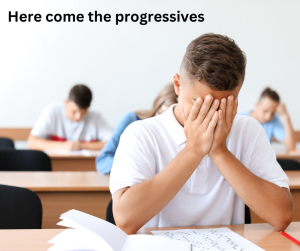Why I fear what Labour will do to the education system
 Here we go again. A new government has vowed to shake up what is taught in schools.
Here we go again. A new government has vowed to shake up what is taught in schools.
A feminist professor, Becky Francis, has been appointed to ‘breathe new life’ into an ‘outdated’ curriculum and a new education secretary wants to stamp her mark on the system.
It is worth noting here that England has been rising up the PISA rankings since the introduction of the present curriculum in 2014. Scotland, which introduced a progressive curriculum, has slumped down the list – its once highly respected education system is now open to ridicule.
All state schools will have to teach whatever changes are introduced by the new government – even academies which presently do not have to.
Prof Francis specialises in education inequalities and gender stereotypes in the classroom and it is said her role could see more girls encouraged to take science, technology, engineering and mathematics (STEM) subjects.
All schoolchildren should have the same opportunities and it is true that there are subjects dominated by one sex or the other.
Cyber is very male-dominated, whereas criminology is female-dominated.
However, trying to even up numbers in certain areas is not as easy as it sounds and can backfire.
There are studies which have shown that countries with more gender equality have fewer female STEM graduates.
Research found that places such as Albania and Algeria have a greater percentage of female STEM graduates than those with high levels of gender equality, such as Finland, Norway and Sweden.
It’s almost as if, when opportunities are ‘levelled up’, boys and girls choose different career paths.
Creating equal career opportunities does not, therefore, automatically lead to an evening-up of boys and girls in certain sectors.
We must accept that there are differences between boys and girls which trendy educationalists might not want to accept.
The new Education Secretary, Bridget Phillipson, has spoken about the exam system and claims children are put under too much pressure.
I take issue with this. Children are officially and nationally assessed three times in the system – at 11 (SATs), GCSE and A Level, and potentially T Levels too if these are not scrapped.
I think it probable that Labour wants to remove SATs. If they are abolished there will be no measures at all in primary schools.
It is already severely diminished by the simplicity of the grading system (‘working towards’, ‘working at’ and ‘working above’ national standard).
The present grading system replaced a very effective system of measuring children’s performance with 18 staging posts in maths and 18 staging posts in English. This should be restored and not weakened further.
Ms Phillipson has also promised that Labour would overhaul the maths curriculum.
It would see children taught to manage their household budgets, exchange currencies and rank their favourite football teams.
It is true that things can be improved but this should include more rigour in the primary system on teaching traditional approaches that have been there for millennia – and not fancy fads that are not worth anything.
If children have been taught the four rules of number, decimals and fractions, can do amount-to-percentage and percentage-to-amount, ratio and probability they can work out household budgets, exchange currencies (using fractions) and rankings of football teams.
If you are taught foundational maths all these things can be in the questions that are set for children.
Financial literacy can only be there if children can do the basics.
Similarly, the English curriculum should be the teaching of good grammar, syntax, punctuation, spelling and vocabulary. This should be coupled with comprehension skills and creative writing. This is traditional but it is what is needed.
My overall fear is that we are facing a radical educational agenda set by the highly progressive educational wing of the educational establishment.
They say ‘evolution and not revolution’ but in my experience, politicians don’t really grasp all the issues.
There are rarely educational experts at the helm. There is a real split in education between the progressives and traditionalists – and the progressives are in the majority. They have been since the 1950s.
Some progress was made to address this in the 2014 curriculum but it didn’t go far enough. The danger is we will go into reverse and be dragged back into the vague and confusing dogma of the progressives.
I am not against creativity, innovation and wanting children to be independent and imaginative thinkers.
However, this will only occur if the foundations are there in the first place. Maths and English are the core subjects and everything else rests on these two planks in the system.
I have long believed that focusing on the primary system is the key to improving the performance of all children across the country. This does not involve scrapping what has been there for the last 14 years. It involves building on it.
ends